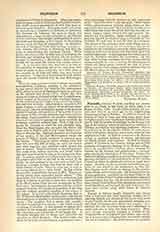

Franzelin, JOHANN BAPTIST, cardinal and theologian; b. at Aldein, in the Tyrol, 15 April, 1816; d. at Rome, December 11, 1886. Despite their poverty, his parents sent him at an early age to the neighboring Franciscan college at Bolzano. In 1834 he entered the Society of Jesus at Graz, and after some years spent in higher studies and teaching in Austrian Poland, began in 1845 his course of theology in the Roman college of the Society, where he also acted as assistant in Hebrew, in which he was especially proficient. Driven from Rome by the Revolution of 1848, he went successively to England, Belgium, and France, where he was ordained in 1849. In 1850 he returned to the Roman college as assistant professor of dogma, and lecturer on Arabic, Syriac, and Chaldean. In 1853 he became prefect of studies in the German college and in 1857 professor of dogmatic theology in the Roman college, where he remained for nineteen years, winning for himself by his lectures and publications a foremost place among the theologians of that time. During this period he acted as consultor to several Roman Congregations, and aided in the preliminaries of the Vatican Council, in which he afterwards served as papal theologian. In 1876, despite his sincere and strenuous protests, he was raised to the cardinalate by Pius IX. This dignity made almost no change in his scrupulously simple and laborious life. He continued his use of poor garments; occupied but two bare rooms in the Jesuit novitiate of Sant’ Andrea; rose every morning at four and spent the time till seven in devotional exercises, always hearing Mass after saying his own; fasted every Saturday, and towards the end of his days Fridays also, besides using other forms of corporal penance.
Though of delicate health, Franzelin had always been a constant and most laborious worker, never allowing himself any recreation during his long years of poor health, severe toil, and painful scruples, save the short recreation after dinner and supper. As a cardinal his sole departure from strict adherence to Jesuit rule was to omit this daily recreation. Moreover, though constantly engaged as Prefect of the Congregation of Indulgences and Relics, and consul-tor of several other Congregations, he steadily refused the aid of a secretary. His entire income as a cardinal he distributed among the poor, the foreign missions, and convents whose property had been seized by the Italian Government. As a theologian Franzelin takes high rank. From the first, his works were recognized as a mine of rich material for the preacher no less than the professor; and for years he was accustomed to receive numerous letters from priests in all parts of the world, spontaneously acknowledging the great aid in preaching they had derived from his books. Of his works, which have gone through numerous editions, the treatise “De Divina Traditione et Scriptura” (Rome, 1870) is considered classical. The others are “De SS. Eucharistiae Sacramento et Sacrificio” (1868); “De Sacramentis in Genere” (1868); “De Deo Trino” (1869); “De Deo Uno” (1870); “De Verbo Incarnato” (1870); some smaller treatises, and the posthumous “De Ecclesia Christi” (1887).
JOHN F. X. MURPHY.

